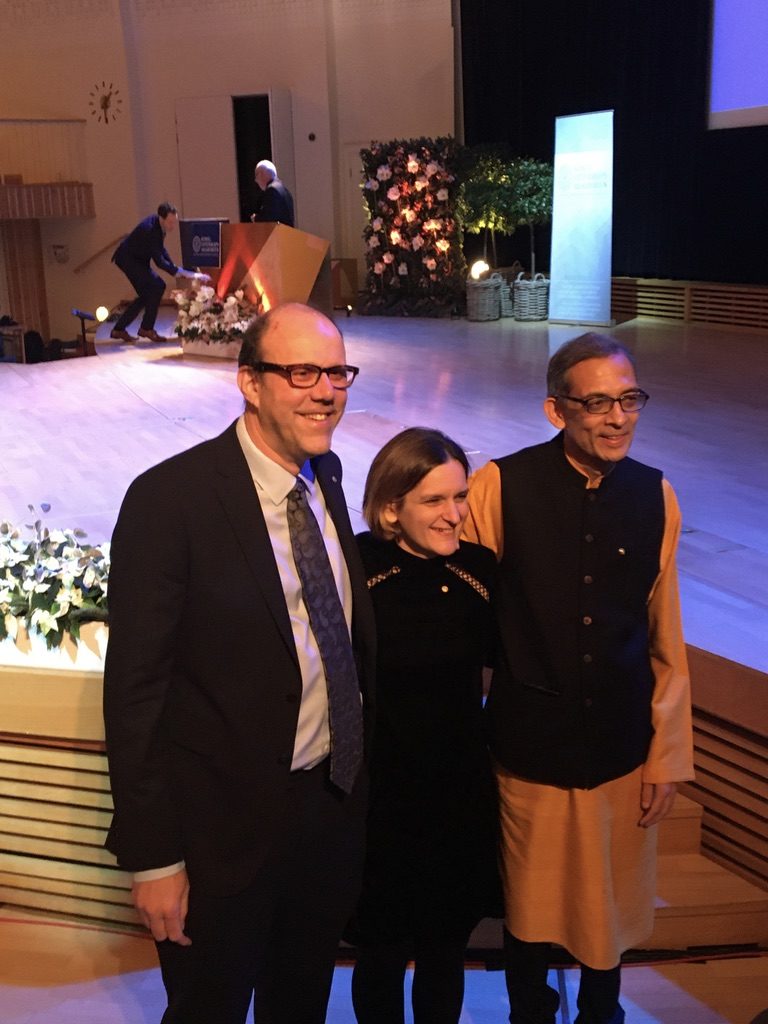Tomoko Harigaya, PAD’s Chief Economist and Director of Research, reflects on what this year’s Nobel Prize in Economics and a recent meta-analysis published in Science mean for our work.
Over the course of the past three weeks, the discursive world in which PAD operates was subject to two seismic shifts: Our co-founder and board member, Michael Kremer, was a co-recipient of the 2019 Nobel Prize for Economic Sciences, and a week later, Science published a new paper by Raissa Fabregas, Michael Kremer, and Frank Schilbach which reports the results of a meta-analysis of randomized evaluations of mobile phone-based agricultural extension services.
I was privileged to witness in person Michael, Esther Duflo and Abhijit Banerjee deliver their Nobel Lectures in Stockholm. For the past week, I’ve been reflecting on the tremendous opportunity that an organization like PAD has to further the work of the “movement” associated with the Laureates – characterized by Esther as “focusing on well-defined questions and being as rigorous as possible”, and one which continues to drive progress in improving the impact of development economics and associated policies. Needless to say, I am quite excited.

“Realizing the potential of digital development: The case of agricultural advice” is one of the first published studies of the impact of digital agricultural extension. Given continued technological advancement, ongoing iteration and improvement of mobile phone-based services, and the potential implicit in data feedback loops to drive learning and increase the magnitude of impacts, we – and indeed the authors themselves – see a great future for empowering smallholder farmers with information delivered and collected by mobile phones.
Here are some of the key takeaways of the paper:
- Mobile phone-based extension on average increases yields by 4% across seven existing studies. The average impact estimate is marginally significant because there is a large variation in the impact estimates of the individual studies.
- Mobile phone-based promotion of a recommended input (agricultural lime in this case) increases the odds of adoption by 22% on average across six existing studies.
- The benefit-cost ratios of these interventions are likely to be high given very low marginal costs of sending mobile messages. Two of the studies included in the meta-analysis, for example, report the benefit-cost ratios of 5:1 – 10:1 in the short-term. In the medium to long term, the authors posit that the marginal cost of adding an additional farmer to a service operating at scale could become close to zero.
- The true impact (and thereby benefit-cost ratio) over time can be substantially larger than the reported estimates. Farmers share advice they receive via mobile phone with other farmers; Digital interventions are conducive to rapid experimentation and iteration; advanced technologies – such as smartphones and videos – can improve customization of the advice.
Measuring the average impact of an agricultural intervention is challenging due to large contextual and year-on-year variation in factors that affect yields and profitability (for example: climate change, soil conditions, market access, and rainfall). Due to these factors, one intervention may be associated with widely divergent effects on yield, for example yields may markedly decrease in a year characterized by drought, and increase in a year when the rains are good. Moreover, the propensity for a farmer to adopt an input may differ on the basis of relative distance to markets. The research roadblocks associated with these types of challenges make a meta-analysis a particularly useful tool for taking stock of the existing evidence, and, critically, for identifying unanswered questions and untapped opportunities for future research.
In the Nobel lecture last week, all three Nobel Prize winners in the Economic Sciences emphasized how experiments generate hypotheses and innovations that uncover a more nuanced understanding of the lives of the poor, iterate and refine existing theories, and ultimately develop better interventions and policies with greater impact. Michael, talked about the importance of building institutions – including not for profit institutions like PAD – to facilitate innovation and collaboration among different stakeholders.
At PAD, we constantly look for opportunities to set up RCTs to measure the impact of our work, but we also emphasize the utility of these experiments for testing innovations and product improvements to increase the impact of our work. For example, we are about to set up a pilot in Odisha to leverage the penetration of smart phones among smallholder communities to source basic information about farmers so that we can reach more farmers, more quickly, with customized advice. There are, of course, a host of important questions around targeting, incentives, and motivations that we still need to explore, and by doing so we hope to contribute to advancing our understanding on how information spreads within social networks.
PAD is uniquely positioned to drive critical aspects of inquiry and development practice. Inter alia:
- PAD’s scale and expanding presence across geographies allows us to undertake coordinated research efforts and accelerate learning, providing insights on heterogeneity (or generalizability) of research findings.
- PAD’s proximity to the academic research community and in-house research capacity help us go beyond running impact evaluations and iterate using empirical evidence and economic theories as we innovate and refine our services.
- PAD’s partnership model – in which we work closely with governments, private-sector partners, funders, and researchers – can remove the (often arbitrary) distinction between research and implementation, and make a significant contribution toward building the nascent culture of innovation, iteration, and learning in the digital development space.
At the conclusion of his Nobel Lecture, Michael challenged himself and his audience with this injunction:
“[When] these celebrations conclude, there will still be millions of people who wake each day in poverty. We must work together, push on, and push harder.”
At PAD, we are proud to push on and push hard!